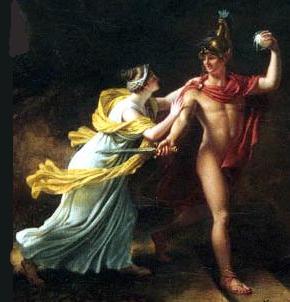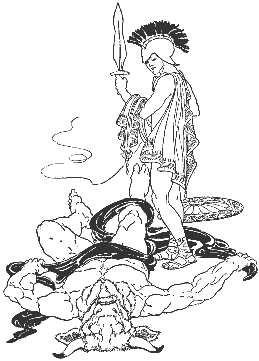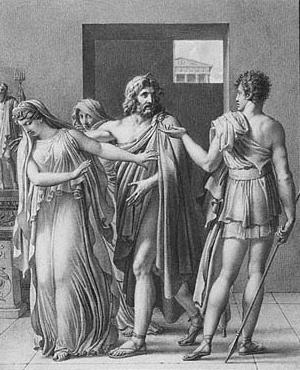Theseus was the son of Aegeus, king of Athens, and of Aethra,
daughter of the king of Troezen. He was brought up at Troezen.
Aegeus parted from Aethra before the birth of his son.
However, he had placed his sword and shoes under a
large stone, and directed her to send his son to Athens when he
became strong enough to roll away the stone and to take them from
under it. When she thought the time had come, his mother led
Theseus to the stone, and he removed it with ease, and took the
sword and shoes.
As the roads were infested with robbers, his
grandfather pressed him earnestly to take the shorter and safer
way to his father’s country, by sea. But the youth, feeling in
himself the spirit and the soul of a hero, decided to take the more
perilous and adventurous journey
by land and to challenge the evil-doers and monsters that oppressed
the country for so long.
His first day’s journey brought him to Epidaurus, where dwelt a
man named Periphetes, a son of Vulcan. This ferocious savage
always went armed with a club of iron, and all travellers stood
in terror of his violence. When he saw Theseus approach, he
assailed him, but speedily fell beneath the blows of the young
hero, who took possession of his club, and bore it ever
afterwards as a memorial of his first victory.
Several similar contests with the petty tyrants and marauders of
the country followed, in all of which Theseus was victorious.
One of these evil-doers was called Procrustes, or the Stretcher.
He had an iron bedstead, on which he used to tie all travellers
who fell into his hands. If they were shorter than the bed, he
stretched their limbs to make them fit it. If they were longer
than the bed, he lopped off a portion. Instead of being
served by this naughty fellow, Theseus served him as the evil-doer
had served others.
Having overcome all the perils of the road, Theseus at length
reached Athens, where new dangers awaited him. Medea, the
sorceress, who had fled from Corinth after her separation from
Jason, had become the wife of Aegeus, the father of Theseus.
At once Media knew by her arts of magic who he was, and feared
the loss of her influence with her husband, if Theseus was
acknowledged as his son. Therefore, she filled the mind of Aegeus
with suspicions of the young stranger, and induced him to present
him a cup of poison.
When Theseus stepped forward to take it, Aegeus recognized the
sword which Theseus wore. Suddenly, Aegeus stopped him to
drink it. Medea fled once more from deserved punishment, and
arrived in Asia, where the country afterwards called Media
received its name
from her.
Aegeus acknowledged the youth, and declared him his successor.
The Athenians were at that time in deep affliction, on account of
the tribute which they were forced to pay to Minos, king of
Crete. This tribute consisted of seven youths and seven maidens,
who were sent every year to be devoured by the Minotaur, a
monster with a bull’s body and a human head. It was exceedingly
strong and fierce, and was kept in a labyrinth constructed by
Daedalus, so artfully contrived that whoever was enclosed in it
could by no means find his way out unassisted. Here the Minotaur
roamed, and was fed with human victims.
Theseus resolved to deliver his countrymen from this calamity, or
to die in the attempt. Accordingly, when the time of sending off
the tribute came, and the youths and maidens were, according to
custom, drawn by lot to be sent, he offered himself as one of the
victims, in spite of the entreaties of his father. The ship
departed under black sails, as usual, which Theseus promised his
father to change for white, in case of his returning victorious.
When they arrived in Crete, the youths and maidens were exhibited
before King Minos
and his daughters, among whom was
Ariadne who
became deeply enamored of Theseus, by whom her love was
readily returned.
 Ariadne gave him a sword, with which he could
encounter the Minotaur. She also gave him a clew of thread by which he
should be able to find his way out of the labyrinth.
He was successful, slew
the Minotaur, escaped from the labyrinth, and taking Ariadne as
the companion of his way, with his rescued companions sailed for
Athens.
Ariadne gave him a sword, with which he could
encounter the Minotaur. She also gave him a clew of thread by which he
should be able to find his way out of the labyrinth.
He was successful, slew
the Minotaur, escaped from the labyrinth, and taking Ariadne as
the companion of his way, with his rescued companions sailed for
Athens.
 On their way they stopped at the island of Naxos, where
Theseus abandoned Ariadne, leaving her asleep.
On their way they stopped at the island of Naxos, where
Theseus abandoned Ariadne, leaving her asleep.
On approaching the coast of Attica, Theseus, disturbed by
abandoning Ariadne, forgot the signal appointed by his father,
and neglected to raise
the white sails, and the old king, thinking his son had perished,
put an end to his own life. Theseus thus became king of Athens.
One of the most celebrated of the adventures of Theseus is his
expedition against the Amazons. He assailed them before they had
recovered from the attack of Hercules, and carried off their
queen, Antiope. The Amazons in their turn invaded the country of
Athens and penetrated into the city. The final battle
in which Theseus overcame them was fought in the midst of
the city. This battle was one of the favorite subjects of the
ancient sculptors, and is commemorated in several works of art
that are still extant. Theseus made love with Antiope, who
later gave birth to Hippolytus.
After the death of Antiope, Theseus married
Phaedra,
another daughter of King Minos. Phaedra saw in Hippolytus a youth
endowed with all the graces and virtues of his
father. She loved him,
but he repulsed her advances, and her love was changed to hate.
She used her influence over her infatuated husband to cause him
to be jealous of his son, and he imprecated the vengeance of
Neptune upon him.

One day, as Hippolytus drove his chariot
along the shore, a sea-monster raised himself above the waters,
and frightened the horses so that they ran away and dashed the
chariot to pieces. Hippolytus was killed, but by Diana’s
assistance Aesculapius restored him to life. Diana removed
Hippolytus from the power of his deluded father and false
stepmother, and placed him in Italy under the protection of the
nymph Egeria.
Theseus at length lost the favor of his people, and retired to
the court of Lycomedes, king of Scyros, who at first received him
kindly, but afterwards treacherously slew him. In a later age
the Athenian general Cimon discovered the place where his remains
were laid, and removed them to Athens, where they
were deposited in a temple called the Theseum, erected in honor
of the hero.
The queen of the Amazons whom Theseus espoused is by some called
Hippolyta. That is the name she bears in Shakespeare’s Midsummer
Night’s Dream, the subject of which is the festivities
attending the nuptials of Theseus and Hippolyta.
Although most people remember Theseus as one of the mythological persons,
the man who had become the prototype of Theseus actually existed in the
ancient Greek history. This “Theseus” united the several
tribes and combined those territories in Attica into one state, of which Athens
became the capital.





